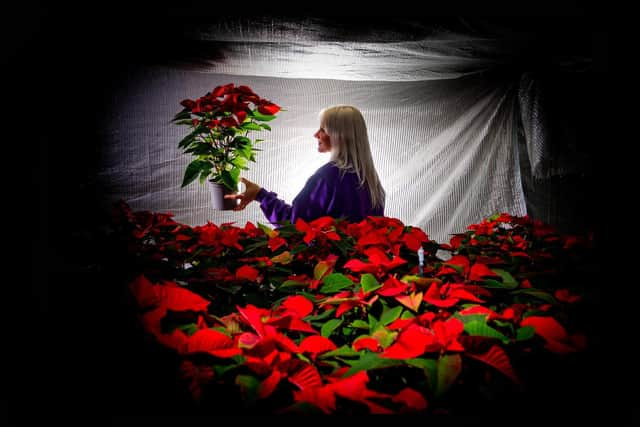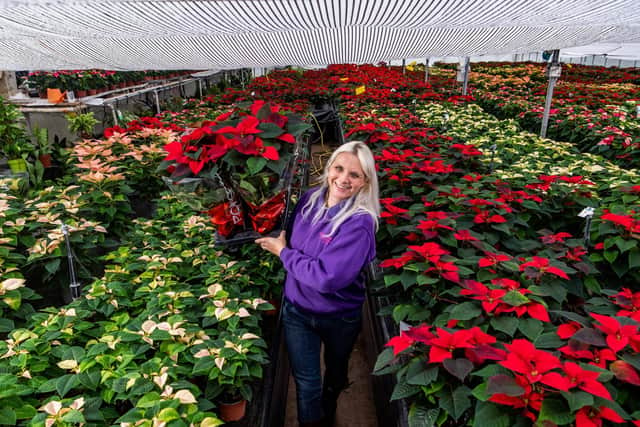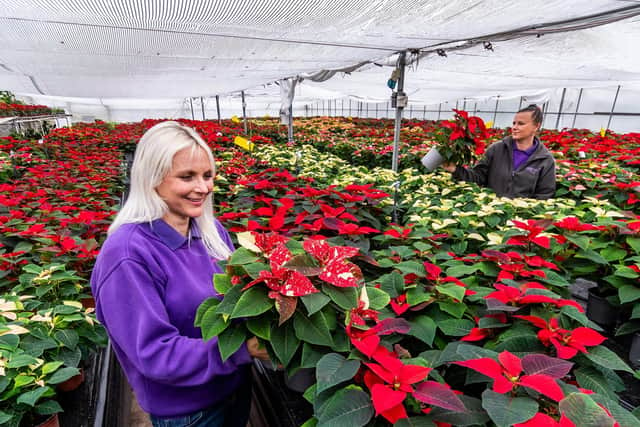Why growing poinsettias is a labour of love for three sisters from Hull
Poinsettias are the most popular festive house plant in the UK, their bright colours cheering up any room.
But for three sisters who grow thousands in a nursery in Hull, they strike a far deeper emotional chord.
Advertisement
Hide AdAdvertisement
Hide AdMichelle Robertson, Debbie O'Brien and Clare Sharp took on the running of the nursery after their dad Mike died on November 20 2017.


Mr O'Brien was one of the first commercial growers of the plants in England and O'Brien's is still the only nursery which grows them in East Yorkshire.
"Dad loved poinsettias," said Clare, who remembers as a child drawing the blackout over an early variety, which needed 12 hours of darkness a day to get the colours developing in the bracts.
They were introduced as festive pot-plants in 1937, by German American grower Paul Ecke.
Advertisement
Hide AdAdvertisement
Hide AdIn his California nursery he developed compact varieties from the wild Mexican spurge Euphorbia pulcherrima.


The plants are no longer simply red, the sisters also growing pinks, mint, white and striking mottled ones called Glitter.
Disaster struck the year after Mr O' Brien died when the cuttings from a former supplier were contaminated with whitefly bemisia tabaci and they had to destroy all their crops.
This year a lot - emotionally and financially - is riding on the successful sale of the 2,912 plants.
Advertisement
Hide AdAdvertisement
Hide Ad"My great-grandad and grandad used to have allotments here on Nursery Lane," said Clare. "Dad started growing and selling a bit but went to work for the council in the parks. He decided he liked growing too much and it built up from there.


"He started growing poinsettias by the late 1960s and by the early 70s he was growing them commercially."
Clare says house plants in general fell out of fashion in the late 1990s and are just coming back - especially during this year of lockdown.
Their dad's passion for plants has obviously been passed along to the trio who grow a wide range of ornamental plants, as well as supplying local hospitals and parks.
Advertisement
Hide AdAdvertisement
Hide AdShe said: "The kids say we love the plants more than them. On a night we say goodnight to them."
The cuttings are supplied by Syngenta starting from a nursery in Kenya in the middle of June and are grown on in a mainly peat compost, which Clare admits is controversial, adding: "The pots are recyclable and the cuttings are Fairtrade."
O'Brien's plants radiate good health and the colours are superb.
"I am hoping people realise that the plants aren't quite the same from the supermarket. They don't get the same care as they do if they are from an independent shop or grower," she said.
Advertisement
Hide AdAdvertisement
Hide AdOne of their many independent stockists is Lara Roberts from Plant & Paint in Humber Street, Hull, who said she was already selling her third batch "and it's still November". She said the
Glitter and Mars Pink varieties were particularly selling well, adding: "People also like the fact they are locally grown - it's even more on their minds this year."
The plants which occur in the wild from Mexico to Guatemala are infamous for dying off because of their sensitivity to cold.
The big growers in Holland have them at 21C, and then they can't take it when temperatures drop below that overnight in people's homes. "O'Brien's are hardy to 13C," she said.
Advertisement
Hide AdAdvertisement
Hide AdTop tips to keep the plants in great shape beyond Christmas:
Keep them warm, in lots of light but out of draughts, don't overwater - let them dry out between waterings.
And make sure you get them out of the packaging as soon as you can.
Comment Guidelines
National World encourages reader discussion on our stories. User feedback, insights and back-and-forth exchanges add a rich layer of context to reporting. Please review our Community Guidelines before commenting.